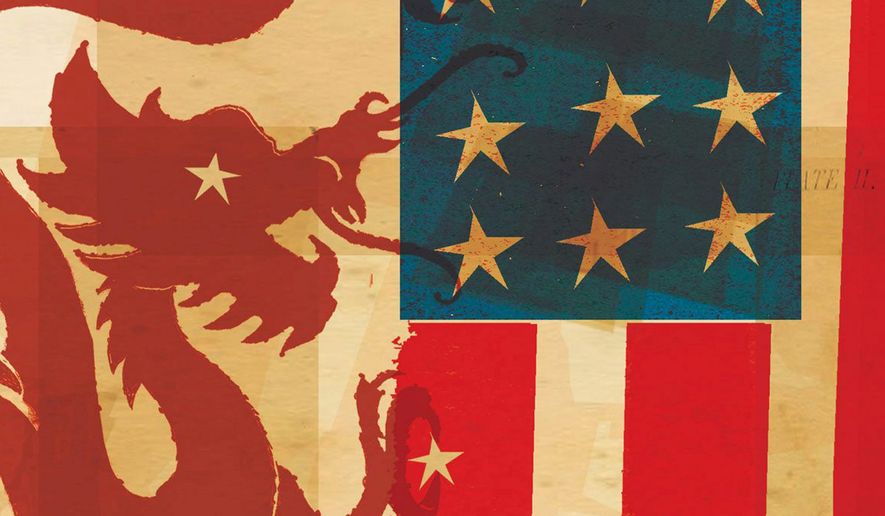OPINION:
The international security meeting in Paris on Monday showcased a world in fear of the growing threat that the Islamic State poses to the global order. A group of 26 countries have now vowed to fight the Sunni extremist group “by any means necessary,” and more will continue to join the effort.
However, there are two countries it seems that we, once again, can’t count on: Russia and China.
Both nations — in different ways — are refusing to get on board.
Russia is insisting that airstrikes must be coordinated with Damascus and Tehran. China has yet to acknowledge the proposal to participate in the U.S.-led coalition delivered last week by National Security Adviser Susan E. Rice.
In this way, Russia and China are not only facilitating the power and reach of rogue regimes such as Syria and Iran, but are also continuing to solidify their alliance, which is actually the leading national-security threat to the United States.
Though few noted it until recently, Russian-Chinese collaboration has been growing for years, tracing back to the 2001 forming of the Shanghai Cooperation Organization, which Vladimir Putin called “a reborn version of the Warsaw Pact.”
In describing his landmark 2013 visit to Moscow — his first trip abroad as Chinese premier — Xi Jinping called it a “testimony to the great importance China places on its relations with Russia. The two sides have had closer strategic coordination on the world stage.” Mr. Putin agreed: Russia and China had “a true partnership,” he said.
Indeed, these longtime adversaries now work together along economic, technological, military and political lines.
Russia and China proceed with strategic and tactical clarity — and often with mutual support. When Russia invaded Crimea in March, China abstained from a vote condemning it in the United Nations. When the European Union proposed new sanctions against Russia recently, Beijing loudly objected and suggested that additional sanctions “may lead to new and more complicating factors” in Ukraine.
Russia and China are increasing their military budgets across the board, while the United States is drawing down. Last week, in advance of the NATO summit, Defense Secretary Chuck Hagel noted that China and Russia are trying to close the military-technology gap with the United States by “developing anti-ship, anti-air, counterspace, cyber, electronic warfare and special operations capabilities that appear designed to counter traditional U.S. military advantages.” In 2013, the two countries conducted joint military exercises on an unprecedented scale.
The world is aflame today in no small part because of the influence of rogue regimes such as North Korea, Iran and Syria — and Russia and China have facilitated their activities, even if they often stay in the background. In their own ways, Moscow and Beijing have cooperated with Iran to mitigate the worst impact of the economic sanctions against it. Despite some hopeful rhetoric on curtailing the North Korean nuclear program, the Chinese have done nothing substantively to rein in Pyongyang. Moscow has been instrumental in the survival of the murderous Assad regime in Syria, where the civil war has killed nearly 200,000 people.
Russia and China are accomplished practitioners of cyberwarfare. The Justice Department indicted five Chinese officers of the People’s Liberation Army for cyber-espionage in May. Russian hackers, almost certainly affiliated with the Kremlin, have wrought havoc on American businesses with cyber-attacks. The latest victim was Home Depot, from which the Russian interlopers are said to have stolen more than a billion passwords. In the fall 2012, then-Defense Secretary Leon E. Panetta warned that the United States could face a “cyber Pearl Harbor.”
Perhaps their deepening partnership explains the increasingly aggressive behavior of both countries in their respective neighborhoods.
Mr. Putin has aroused memories of 1939 with his aggression in Ukraine, where tens of thousands of Russian troops and hundreds of tanks are currently operating — and he has hinted that he may move on to the Baltics. In a telephone conversation with the outgoing head of the European Commission, Mr. Putin reportedly said, “If I want, I’ll take Kiev in two weeks.”
China is more subtle, but no less aggressive. Beijing continues to provoke violent encounters in parts of the South China Sea and to press territorial disputes with South Korea, Vietnam, Malaysia and the Philippines.
In all they do, Russia and China rely on a lack of strategic vision and political will on the part of the United States and the Western alliance. Although it’s too early to say whether the American and allied response to re-energized Islamic extremism will prove effective, it’s worth remembering that some of the Obama administration’s most highly touted foreign-policy initiatives — the “reset” with Russia and the “Asian pivot” — have already failed.
President Obama likes to tell listeners that the Cold War was more formidable than our circumstances today. In 2014, though, we face a situation more dynamic and arguably more challenging than the Cold War. Only the United States can stand up to Russian and Chinese aggression and counter their anti-democratic message. Doing so is central to regaining our national strength — and vital to the peace and security of the world.
Douglas E. Schoen and Melik Kaylan are authors of the “Russia-China Axis: The New Cold War and America’s Crisis of Leadership” (Encounter Books, 2014).




Please read our comment policy before commenting.